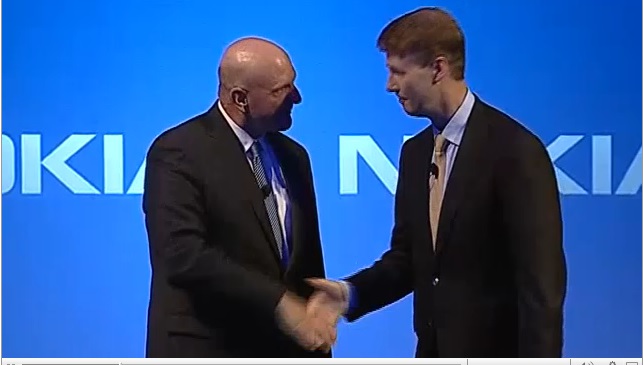Nokia Bids Emotional Farewell To Phones

Selling the phone business to Microsoft is the best option, Nokia chairman tells press conference
Nokia chairman Risto Siilasmaa has detailed the agreement to hand the company’s phone business over to Microsoft, in an emotional press conference which confirmed Stephen Elop is to move to Microsoft, and revealed some more investment into Finland by Microsoft.
Assuming the deal completes, it will give Microsoft control of Nokia’s mobile phones, and the right to use the Nokia brand, as well as a ten-year licence for Nokia’s patents. Nokia will keep control of those all-important patents, as well as its mapping and location subsidiary, Here, and the infrastructure division, Nokia Solutions and Networks (NSN – originally a joint venture with Siemens). Siilasmaa will be interim CEO of Nokia, as Elop stands down from that role to head the phone division only until it merges into Microsoft – once all the relevant authorities approve the deal.

Phones continue in Finland
“Rationally the transaction is the right step, but emotionally it is more complex,” said Siilasmaa, chair of the Nokia board. The deal is already seen as a positive step for the company, giving it new investment, hanging onto some very good assets, and placing the phones where they are most likely to do well.
Nokia shares rose this morning: “Nokia looks to open up between 22 and 25 percent,” Neil Marsh, strategist at Newedge, told Reuters. “The Microsoft deal is pretty good news … the fact that they’ve found a buyer is quite impressive. It’s all adding to the bullishness of the market, and I am still pretty bullish.”
Siilasmaa and Elop emphasised that the phones would still bear the Nokia brand and be designed in Finland, where Microsoft gains nearly 5000 people – out of around 32000 overall joining from Nokia.
Finland will become a major European centre for Microsoft, said Siilasmaa, and the software giant will build a new $250 million data centre there for its Azure cloud business – a second data centre alongside its Ireland plant.
Microsoft will put up €1.5 billion in stock right away (in convertible bonds maturing in five to seven years), which will remain at Nokia even if the deal doesn’t go through.
Meanwhile, Nokia itself will continue, said Siilasmaa, with 56,000 staff and a value of approximately €13 billion. The deal effectively creates “two Nokia companies in the Finnish economy,” he said, in a comment designed to sell the deal to the Finnish authorities.
Nokia’s dilemma
The deal came about as a result of the dilemma faced by Nokia and Microsoft, in which the phone industry has “become a duoploy”, said Siilasmaa., in which the hardware and software of mobile phones have to be closely aligned. With the failure of Symbian and the adoption of Windows Phone, “Nokia does not have the resources” for this world, he said.
Microsoft, on the other hand, has resources to invest and a new focus on hardware, where it lacked expertise and a business model. It is not worth Microsoft’s while to spend money to win a new customer for its phones, if it only gets a licence fee back, he said.
Both Elop and Siilasma, and Steve Ballmer in a brief appearance, stressed that Windows Phone is actually making strong progress to become “the third ecosystem”, after iOS and Android, but Elop said that “more was needed”.
Today’s announcement was not a huge surprise, but its fallout will be interesting.
The Asha feature phone also goes to Microsoft where it will be seen as an “on-ramp” to Windows Phone, according to Elop, so its future may not be all that rosy.
Other players who may be concerned include other Microsoft phone partners such as HTC, who will now operate at a substantial disadvantage compared with Microsoft’s in-house hardware team in Finland.
“The decisions we have made will be debated for many years,” said Elop. “It continues to be an exciting time for our devices and services business.”
how well do you know Nokia? Try our quiz!